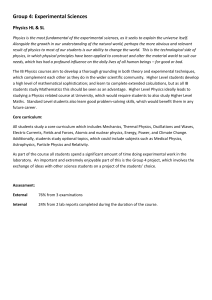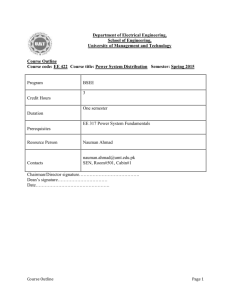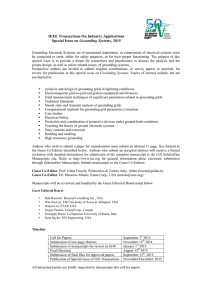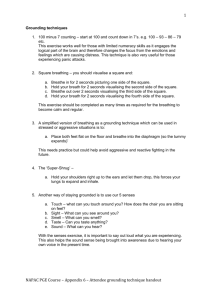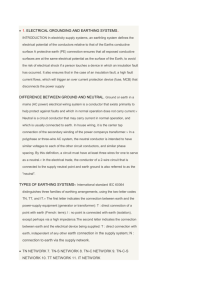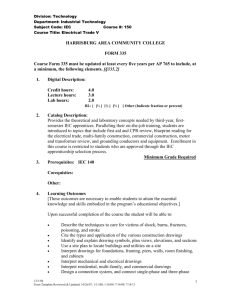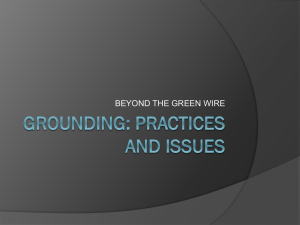Section #26 05 27 - Grounding – Primary
advertisement
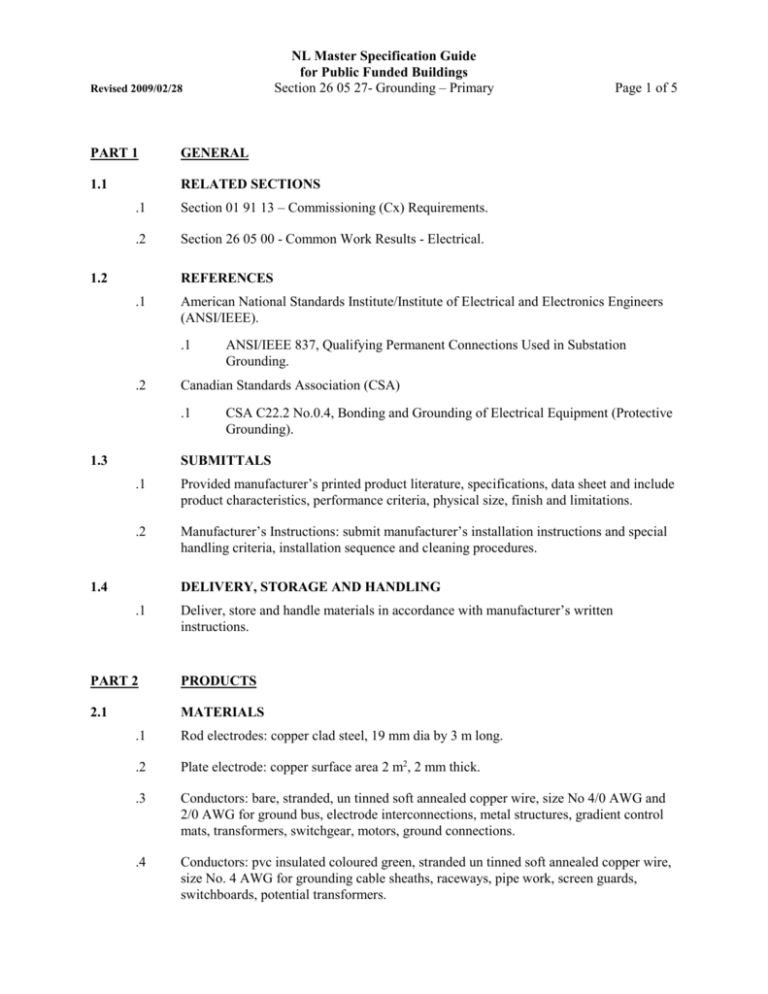
NL Master Specification Guide for Public Funded Buildings Section 26 05 27- Grounding – Primary Revised 2009/02/28 PART 1 GENERAL 1.1 RELATED SECTIONS .1 Section 01 91 13 – Commissioning (Cx) Requirements. .2 Section 26 05 00 - Common Work Results - Electrical. 1.2 Page 1 of 5 REFERENCES .1 American National Standards Institute/Institute of Electrical and Electronics Engineers (ANSI/IEEE). .1 .2 Canadian Standards Association (CSA) .1 1.3 ANSI/IEEE 837, Qualifying Permanent Connections Used in Substation Grounding. CSA C22.2 No.0.4, Bonding and Grounding of Electrical Equipment (Protective Grounding). SUBMITTALS .1 Provided manufacturer’s printed product literature, specifications, data sheet and include product characteristics, performance criteria, physical size, finish and limitations. .2 Manufacturer’s Instructions: submit manufacturer’s installation instructions and special handling criteria, installation sequence and cleaning procedures. 1.4 DELIVERY, STORAGE AND HANDLING .1 Deliver, store and handle materials in accordance with manufacturer’s written instructions. PART 2 PRODUCTS 2.1 MATERIALS .1 Rod electrodes: copper clad steel, 19 mm dia by 3 m long. .2 Plate electrode: copper surface area 2 m2, 2 mm thick. .3 Conductors: bare, stranded, un tinned soft annealed copper wire, size No 4/0 AWG and 2/0 AWG for ground bus, electrode interconnections, metal structures, gradient control mats, transformers, switchgear, motors, ground connections. .4 Conductors: pvc insulated coloured green, stranded un tinned soft annealed copper wire, size No. 4 AWG for grounding cable sheaths, raceways, pipe work, screen guards, switchboards, potential transformers. NL Master Specification Guide for Public Funded Buildings Section 26 05 27- Grounding – Primary Revised 2009/02/28 Page 2 of 5 .5 Conductors: pvc insulated coloured green, stranded un tinned soft annealed copper wire No. 10 AWG for grounding meter and relay cases. .6 Conductors: No. 3/0 AWG extra flexible (425 strands) copper conductor for connection of switch mechanism operating rod to gradient control mat, fence gates, vault doors. .7 Bolted removable test links. .8 Gradient control mat: copper, size 1.5 x 1.5 m, 50 x 50 mm mesh and 2 mm thick. .9 Accessories: non-corroding, necessary for complete grounding system, type, size material as indicated, including: .1 .2 .3 .4 .5 .6 Grounding and bonding bushings, Protective type clamps, Bolted type conductor connectors, Thermit welded type conductor connectors, Bonding jumpers, straps, Pressure wire connectors. .10 Grounding resistance bank: in door, 3 phase, star connected liquid type, rating as indicated. .11 Zig-zag grounding transformer: in door, 3 phase, star connected, air cooled, iron core, KVA size and voltage as indicated. .12 Cable sheath isolating transformer or sleeves. .13 Wire connectors and terminations: as indicated. PART 3 EXECUTION 3.1 GROUNDING INSTALLATION .1 Install continuous grounding system including, electrodes, conductors, connectors and accessories in accordance with CSA C22.2 No.0.4 and requirements of local authority having jurisdiction. .2 Ground fences to grounding system independent of station ground. .3 Install connectors in accordance with manufacturer's instructions. .4 Protect exposed grounding conductors from mechanical injury. .5 Make buried connections, and connections to electrodes, structural steel work, using copper welding by thermit process. .6 Use mechanical connectors for grounding connections to equipment provided with lugs. Revised 2009/02/28 NL Master Specification Guide for Public Funded Buildings Section 26 05 27- Grounding – Primary Page 3 of 5 .7 Use No. 4/0 AWG bare copper cable for main ground bus of substation and No. 2/0 AWG mhd bare copper cable for taps on risers from main ground bus to equipment. .8 Use tinned copper conductors for aluminum structures. .9 Do not use bare copper conductors near un-jacketed lead sheath cables. .10 Install grounding resistor bank, as indicated. .11 Install zig-zag grounding transformer, as indicated. 3.2 ELECTRODE INSTALLATION .1 Install ground rod or plate electrodes, as indicated. Make grounding connections to station equipment. .2 Install ground rod electrodes at transformer and switchgear locations. .3 Install gradient control mats. Connect mats to station ground electrode and switch mechanism operating rods. .4 Make special provision for installing electrodes that will give acceptable resistance to ground value, where rock or sand terrain prevails. 3.3 EQUIPMENT GROUNDING .1 Install grounding connections as indicated to typical station equipment including: metallic water main, line sky wire, neutral, gradient control mats. Non current carrying parts of: transformers, generators, motors, circuit breakers, reclosers, current transformers, frames of gang-operated switches and fuse cutout bases. Cable sheaths, raceways, pipe work, screen guards, switchboards, potential transformers. Meter and relay cases. Any exposed building metal, within or forming part of station enclosure. Sub-station fences, pothead bodies. Outdoor lighting. .2 Ground hinged doors to main frame of electrical equipment enclosure with flexible jumper. .3 Connect metallic piping (water, oil, air, etc.) inside station to main ground bus at several locations, including each service location within station. Make connections to metallic water pipes outside station to assist in reduction of station ground resistance value. 3.4 NEUTRAL GROUNDING .1 Connect transformer neutral and distribution neutral together using 600 V insulated conductor to one side of ground test link, the other side of the test link being connected directly to main station ground. Ensure distribution neutral and neutrals of potential transformers and service banks are bonded directly to transformer neutral and not to main station ground. Revised 2009/02/28 NL Master Specification Guide for Public Funded Buildings Section 26 05 27- Grounding – Primary Page 4 of 5 .2 Interconnect electrodes and neutrals at each grounding installation. .3 Connect neutral of station service transformer to main neutral bus with tap of same size as secondary neutral. .4 Ground transformer tank with continuous conductor from tank ground lug through connector on ground bus to primary neutral. Connect neutral bushing at transformer to primary neutral in same manner. 3.5 POLE MOUNTED SWITCHING DEVICE GROUNDING .1 Drive four ground rods 3 m long at base of each pole on which group-operated line switching devices are mounted. .2 Arrange rods in square formation with 3 m sides, located so that operator must stand within square to operate switch. .3 Interconnect ground rods with No. 2/0 AWG stranded annealed copper conductor and join to switch operating handle ground wires. .4 Connect operating handle of switch to handle base with No. 3/0 AWG extra flexible copper conductor. 3.6 POLE MOUNTED TRANSFORMER GROUNDING .1 3.7 Drive ground rods at base of each pole on which transformers are mounted and interconnect transformer, system neutral, lightning arresters and ground rods. GROUNDING IN MANHOLES .1 Install conveniently located grounding stud, electrode, size 3/0 stranded copper conductor in each manhole. .2 Install ground rod with lug for grounding connection in each manhole so that top projects through bottom of manhole. 3.8 GROUNDING IN PERMAFROST .1 3.9 Install system and equipment grounding in permafrost area in accordance with Section 26 05 28 - Grounding - Secondary. CABLE SHEATH GROUNDING .1 Bond single conductor, metallic sheathed cables together at one end only. Break sheath continuity by inserting insulating sleeves in cables. .2 Use No. 6 AWG flexible copper wire soldered, not clamped, to cable sheath. .3 Connect bonded cables to ground with No. 2/0 AWG copper conductor. Revised 2009/02/28 3.10 NL Master Specification Guide for Public Funded Buildings Section 26 05 27- Grounding – Primary Page 5 of 5 FIELD QUALITY CONTROL .1 Perform tests in accordance with Section 26 05 00 – Common Work Results - Electrical and Section 01 91 13 – Commissioning (Cx) Requirements. .2 Perform earth loop test and resistance tests using method appropriate to site conditions and to approval of Owner’s Representative and local authority having jurisdiction. .3 Perform test before energizing electrical system. .4 Engage testing agent to inspect grounding and perform resistance test before backfill. END OF SECTION
